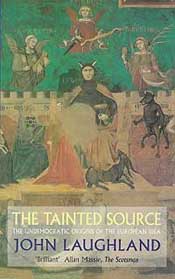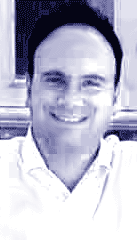|
The Undemocratic Origins of the European Idea by John Laughland
The drive for European Unity is also fascist at a political and cultural
level, and Laughland goes into great detail about the various youth movements
in Belgium and France, who held a Todtnauberg style youth camp at Zoute
in Belgium, 11th - 19th July 1936. There were other groups such as Ordre
Nouveau, Jeune Europe, and L'Action Francaise. Denis de Rougemont, a Swiss
political theorist is an important link here, who got the idea off the trains:
'I could read on the long brown carriages Amsterdam, Basel, Milan, Zagreb,
Bucharest. For the first time, I felt Europe.' [p 58]. Letter to Hitler:
'Your work is courageous, it has grandeur.' (November 1933) There are figures
like Henri de Man, and Paul Henri Spaak, later author of the Spaak Report
(1956) a key document in their post WW2 drive towards unification, who,
in 1940, undermined Belgian defence plans by engineering a railway strike
just as the Germans invaded. [pp 64-65] Otto Abetz, an agent for Ribbentrop,
linked between the various groups, among them Leon Degrelle and the Rexists,
Degrelle later fighting in the Waffen SS. Vichy recruited slave workers,
and soldiers for the first single European army: 'With your European comrades,
under the SS sign, you will win.'
Laughland goes into the European political culture, which is fundamentally
anti-democratic and founded on lies and deception. It functions, not through
consensus, but is 'Dirigiste', working via secretive managerial diktat.
The Euro is being imposed, and with a single currency comes a single political
system. Laughland essentially objects to this, because he supports the free
market, but it also brings the abolition of the individual state's sovereignty.
Hitler's disparaging talk of 'Kleinstaatengerumpel' again. Some of this
is straightforwardly self-contradictory tosh; Margaret Thatcher speaking
of 'rolling back the frontiers of the state' but anxiously trying to protect
her national borders, for example. He writes of the European myth of inevitability,
which has to be challenged. Where this book is good is in the exposure of
the fascist origins of Europe; the free market stuff and advocacy of the
gold standard are less than convincing, as is the material about EU expansion
eastwards.
|
|||
|
BLUE is looking for short fiction, extracts of novels, poetry, lyrics,
polemics, opinions, eyewitness accounts, news, features, information and arts
in any form relating to eco cultural- social- spiritual issues, events and
activites (creative and political). Send to Newsdesk. |


 'Personalism' and the figure of Emmanuel Mounier are examined at length.
In the early 1930s, the journal 'Esprit' was seen as a Catholic version
of Otto Strasser's 'Plans', and was partly published using funds secretly
channeled from Ribbentrop via Les Editions de la Toison d'Or. 'We very
well know that they decant, purify and perfect the thick foreign currents;
they bring the experiences to fruition. French National Socialism will simply
be more artful than the others.' ('Sur un certain front unique', January
1933) There were other links to Otto Strasser's 'Black Front' and Harro
Schulze-Boysen (later executed by the Nazis) There was talk of communitarianism
and the 'third way'. Mounier dined with Goebbels and Himmler, and published
a pro-Hitler book in February 1939. In 1940, Mounier was in pole position,
and 'Esprit' became a key Vichyite publication. Mounier became one of the
leading lights behind the Uriage Vichy Staff College. Later, he was ousted
during an anti Catholic purge, and mistakenly arrested as a member of the
Resistance, which error later was used to rehabilitate him. Post WW2, Mounier
seems to have been motivated by hostility towards the US, similar to that
expressed by Heidegger at around the same time.
'Personalism' and the figure of Emmanuel Mounier are examined at length.
In the early 1930s, the journal 'Esprit' was seen as a Catholic version
of Otto Strasser's 'Plans', and was partly published using funds secretly
channeled from Ribbentrop via Les Editions de la Toison d'Or. 'We very
well know that they decant, purify and perfect the thick foreign currents;
they bring the experiences to fruition. French National Socialism will simply
be more artful than the others.' ('Sur un certain front unique', January
1933) There were other links to Otto Strasser's 'Black Front' and Harro
Schulze-Boysen (later executed by the Nazis) There was talk of communitarianism
and the 'third way'. Mounier dined with Goebbels and Himmler, and published
a pro-Hitler book in February 1939. In 1940, Mounier was in pole position,
and 'Esprit' became a key Vichyite publication. Mounier became one of the
leading lights behind the Uriage Vichy Staff College. Later, he was ousted
during an anti Catholic purge, and mistakenly arrested as a member of the
Resistance, which error later was used to rehabilitate him. Post WW2, Mounier
seems to have been motivated by hostility towards the US, similar to that
expressed by Heidegger at around the same time.
 Green Anarchist:
Green Anarchist: